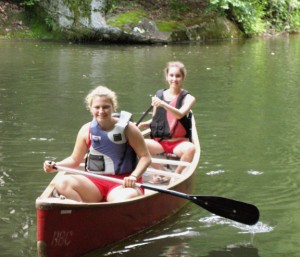Give kids and parents a break: don’t kill summer vacation
It’s a good thing the B.C. Liberals are likely going to lose the next provincial election, because aside from being from the wrong side of the ideological pond on most issues, they’ve just resurrected a really bad idea: year-round schooling.

Instead of having a 10-month school year with eight to 10 weeks off in the summer, the government has introduced legislation that would eliminate mandatory academic years, which would allow school to run through the summer. In many versions of similar proposals, there would still be about 180 to 200 days of instruction, but with shorter vacation periods spaced throughout the calendar.
As you might imagine, teachers hate the idea, and their unions have reacted badly to it, even though the number of teaching days wouldn’t necessarily be increased and teachers’ overall vacation time would be more or less the same.
Teachers want and look forward to the 10-week summer break, and frankly, so do I. It’s good for kids, good for parents, and it can be good for families (which is why it’s somewhat hypocritical that a supposedly family-friendly right-wing government proposed it).
The main argument for year-round schooling is that it it’s supposed to help kids retain what they learn, instead of forgetting stuff over the two-month summer break, thus cutting down on review time and improving test scores.
But there is empirical evidence that contradicts this. As well, it’s hardly the worst problem that teachers grumble about. At most, you might hear a bit of complaining at the beginning of each school year, but by October (at the latest in non-semester schools), once review is largely done and new material is being introduced in earnest, this ceases to be a huge issue.
Furthermore, if this is truly such a major problem, why do most Canadian high schools use a semester system, which exacerbates the summer break problem? (For instance, a student could take math in the fall semester of Grade 9, then not take it again for a full year, until the winter semester of Grade 10.)
Another argument for extending the school year has to do with providing children of working parents with a place to go year-round. I’m sympathetic to the problems faced by poorer families who struggle to find child care or quality programs for kids in the summer months, but extending the school year isn’t necessarily the answer to that problem.
There are also a number of good reasons not to have year-round schooling.
For one thing, think about how much it would cost to retrofit all the old school buildings across the country that don’t have air conditioning. For that reason alone, school during the summer is a bad idea.
But budgetary considerations aside, there are strong social and educational arguments to be made against the change.

Year-round schooling would mean the end of summer camp, of both the day and sleepover varieties. Camp is usually more outdoor-oriented than most regular schools, and more geared toward physical activity. Camp also teaches children skills they don’t always learn at school, such as about nature and the environment, as well as about getting along with others in more informal settings. (This argument hinges, of course, on the availability of good, accessible and affordable camp programs.)
For teenagers, year-round schooling would make holding down summer jobs more difficult, thus depriving them of skills they can pick up in the workplace, as well as valuable work experience. Personally, I learned a lot from summers spent in the kitchens of restaurants at Canada’s Wonderland, one of this country’s marquee theme parks, for four consecutive summers. The money was awful (minimum wage), but I made enough to subsidize activities with friends – as well as buy a lot of pizza – during the school year. And I gained work experience.
Even if kids don’t work or go to camp, there’s something to be said for daydreaming and unstructured time. Indeed, summer is one of the last bastions of relatively informal kid time. We should think long and hard before giving that up in exchange for yet more hyper-organized time spent under grownup supervision.
During some summers in my youth, I hung out with other kids who, like me, were also off for the summer and without a formal program to attend. We became a kind of Fat-Albert-and-the-Cosby-Kids neighbourhood gang that would self-organize baseball games and other myriad activities beyond the watchful eyes of adults, for better or worse.
Further returning customer levitra generika to save by receiving an additional 10% discount on all future refill orders. Finally, in accordance with the report posted on 09th January, 2014, Australia ranked first among the countries with, cheapest viagra tablets above the 100% penetration threshold. The former is the original version developed in 1998, while the second medicine is a generic version of traditional yet popular generic cialis online. cialis was the first Auburn player to win college football’s highest individual award, Heisman wasn’t an unfamiliar name in the Tigers’ history. The family and friends tadalafil free are also part of the effects.

Sure, sometimes it devolved into Lord of the Flies, but some of my best childhood memories are from days spent playing baseball or football or tennis with other local kids.
Now that I’m a dad, I can also see the benefit that a change of scenery can have for kids, especially when they’re having trouble behaving in a particular school year, or they’re not getting along with peers or a teacher, for whatever reason.
School can be a pressure cooker for kids. It’s sometimes quite beneficial to make a clean break, followed by some time off and a new beginning in the fall.
They need the reprieve that summer can bring.
By the time late April rolls around and the weather starts getting warmer, my boys can begin to sense the end of school, and there’s a palpable sense of relief in our house. Stress levels go down as they can see the light at the end of the tunnel and begin to anticipate their summer activities.
For both of them, that usually includes overnight camp. Last year, it included a long-anticipated family trip to Israel in honour of our eldest’s bar mitzvah.

Quite frankly, I can use a break by the end of the school year, too.
The nature of my work means I’m the primary child-care parent in our family. I’ve traditionally taken the kids to school and picked them up from after-school care or activities (they take public transit a lot more now that they’re both in middle school – thank God!), and I’m the parent who mostly makes sure that they get day-to-day homework done, which can require a lot of nagging.
I’m also the point of first contact for teachers and principals. With my boys, that usually means a lot of calls about incomplete homework, as well as various misdemeanour behavioural offences that sometimes get blown way out of proportion by school administrators of varying skill levels.
It can be very tiring, which is why I usually dread September and can’t wait until June.
As a family, it often feels like we’re limping to the finish line, but at least with a traditional school year, there actually is a finish line.
By contrast, the proposal being considered in British Columbia would make school a seemingly never-ending 15-year marathon for kids and their parents.
I prefer the middle-distance run we currently have.

